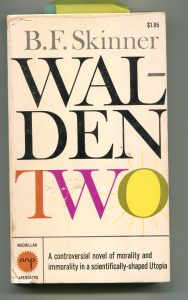 The book store in Kona, Hawaii, is like a literary burial ground. Maybe people come to Hawaii with a book from their past library and probably don’t want to pack it back home. There I found that kind of relic, a copy of a paperback circulating in the late 60s (might still be). Even required reading in San Francisco college. Walden Two, a novel first published in 1948 by the behaviorist psychologist B.F. Skinner.
The book store in Kona, Hawaii, is like a literary burial ground. Maybe people come to Hawaii with a book from their past library and probably don’t want to pack it back home. There I found that kind of relic, a copy of a paperback circulating in the late 60s (might still be). Even required reading in San Francisco college. Walden Two, a novel first published in 1948 by the behaviorist psychologist B.F. Skinner.
The copy I purchased had been a gift from Brian to Ian, as inscribed, “One dreamer to another. Cherish this book,” Brian exhorts, “It is the Classic of the Millennium!” Brian presented that tome of hope to Ian in 1970. Considering the explosive political events of today, it’s almost measurable how much that cherished world Brian and Ian wished upon the world has hit home.
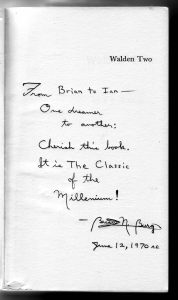 The simplicity of its writing style gives off the first whiff of the socialist progressive mind. Walden Two comes off like a primer for school children, similar to the schoolmarm way Al Gore addresses an audience. Contrasted with the dark futures Huxley and Orwell give us, Skinner’s vision casts a golden light on what is called in his novel “a new world order.” And it’s told in a simplistic narrative forming catechism and guide book for social controllers in the manner of Dr. Comrade Pavlov.
The simplicity of its writing style gives off the first whiff of the socialist progressive mind. Walden Two comes off like a primer for school children, similar to the schoolmarm way Al Gore addresses an audience. Contrasted with the dark futures Huxley and Orwell give us, Skinner’s vision casts a golden light on what is called in his novel “a new world order.” And it’s told in a simplistic narrative forming catechism and guide book for social controllers in the manner of Dr. Comrade Pavlov.
Skinner’s Utopia was certainly underlined by a type of political unrest in the 60s bent on the deconstruction of existing social institutions, and it was finally taking firm hold on the “academic” mind. Point-by-point, the task list of breaking down existing social values is all explained in the book with blithe simplicity by the guiding character named Frazier.
First off, riddance of the family.
“A community,” Frazier explains, “must solve the problem of the family by revising certain established practices. That’s absolutely inevitable. The family is an ancient form of community and the customs and habits which have been set up to perpetuate it are out of place in a society which isn’t based on blood ties. Walden Two replaces the family, not only as an economic unit, but to some extent as a social and psychological unit as well. What survives is an experimental question.”
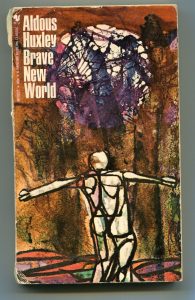 Ridding society of family, a familiar theme in Utopian wet dreams, was wickedly satirized in Aldous Huxley’s anti-Utopian novel, Brave New World. In that supposedly perfect world, babies were made in test tubes. So everything, including individual intelligence, could be controlled. Education is a breeze when conditioned robotoids are the subjects. In Walden Two, mechanical birth is unnecessary since minds, as seen in the present Age of Television, can be conditioned without the trouble of brewing them up in test tubes. Imagination can be excised. Study is minimized, devalued, and of course controlled. And the first subject for control would be, of course, history.
Ridding society of family, a familiar theme in Utopian wet dreams, was wickedly satirized in Aldous Huxley’s anti-Utopian novel, Brave New World. In that supposedly perfect world, babies were made in test tubes. So everything, including individual intelligence, could be controlled. Education is a breeze when conditioned robotoids are the subjects. In Walden Two, mechanical birth is unnecessary since minds, as seen in the present Age of Television, can be conditioned without the trouble of brewing them up in test tubes. Imagination can be excised. Study is minimized, devalued, and of course controlled. And the first subject for control would be, of course, history.
“Any single historical event is too complex to be adequately known by anyone. It transcends all the intellectual capacities of men. Our practice is to wait until a sufficient number of details have been forgotten, Of course things seem simpler then! Our memories work that way; we retain the facts which are easiest to think about…”
Since Walden Two “wisdom” preaches no history is knowable, then that war between the states, for example, was simply an illusion. And doesn’t it follow that, since history is invalid, history can bear no heroes?
“The hero… is a device which the historian has taken over from the layman. He uses it because he has no scientific vocabulary or technique for dealing with the real facts of history— the opinions. emotions, attitudes; the wishes, plans, schemes; the habits of men. He can’t talk about them, and so he talks about heroes. But how misleading that is! How inevitable that personal characteristics and private affairs be mixed with the hero type!”
“History is bunk,” wrote Henry Ford in his autobiography. Taking that statement, Aldous Huxley turned Ford into the future mechanical godhead in Brave New World where all history is stopped. Erasing history is prime target for the controller.
Deconstruction’s hard work because old things don’t fall so easily
All history in George Orwell’s 1984 goes down the memory hole in the Ministry of Truth to be categorically forgotten. Thus, new history is a cinch. Eurasia was always at war with Oceana. Or no, it was at war with Eastasia. Wasn’t Oceana always allied with Eurasia? And Sherman never took Atlanta, and Lee never defended it. Just a bunch of northerners and rebs with a serious attitude. Might as well get rid of the statues commemorating those phony historical leaders, as well. Let the pigeons shit on something else. Folks needn’t be reminded of those complicated matters.
Shortly before Brian presented Walden Two with love to his pal Ian in 1970, the leaders of the Students for Democratic Society— the Weathermen— were indicted. Among them was Kathy Boudin, a “Weatherperson,” who, along with Black Liberation Army members, robbed a Brinks truck and killed a guard and two policemen. Bernadine Dohrn leader of the “Weather Women” (not to be confused with horror show Wasp Women) later on mated with Bill Ayers, who himself wound up as a presidential ally, neighbor, and mentor of Barack Hussein Obama.
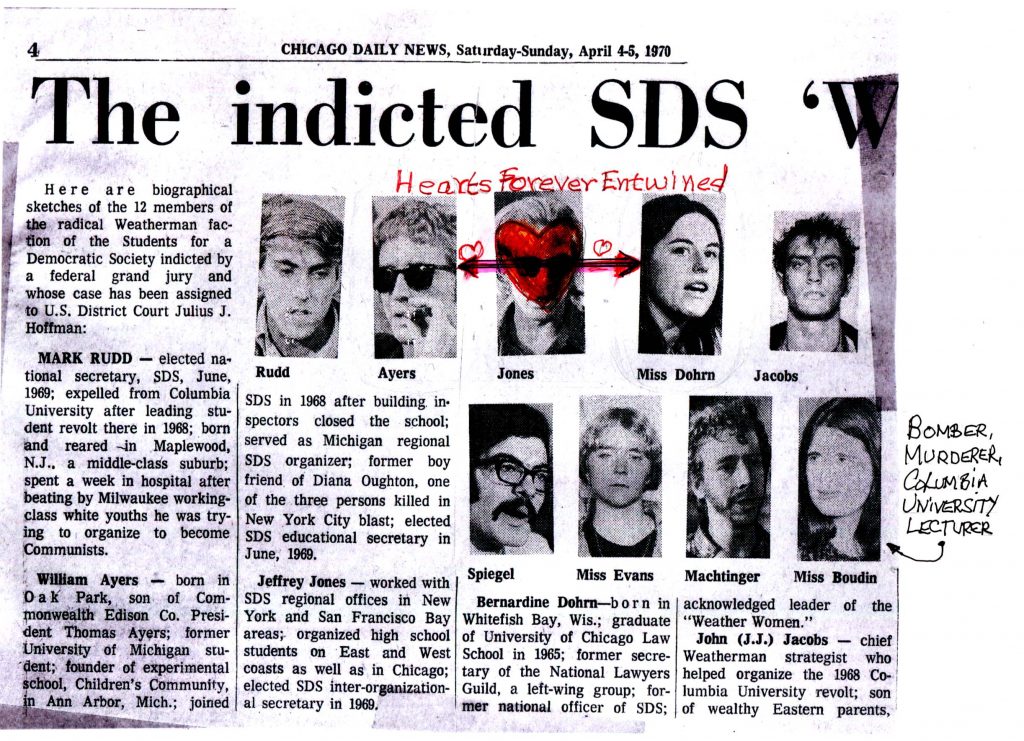
EDUCATORS, UNITE!
These worthies are mentioned in connection with Walden Two for the simple reason that they represent “Walden Two Point Too.” Professor William Ayers, former terrorist bomber now currently guardian of public education, wrote on white supremacy in modern education, years ahead of his time. (Teaching the Personal and the Political; Teaching Toward Freedom: Moral Commitment and Ethical Action). Ms. Boudin, as reported, is very popular at her funded gig lecturing on the law at Columbia.
True believers like them, and hosts of others, underline what has slipped within the field of what can no longer honestly be called Education. They also exemplify a decidedly sinister force infecting the minds of people who pay enormous amounts of money to be indoctrinated instead of educated. There are so many cross-threads of wealth, power, and corruption in a system that was never meant to be part of government. Education was left out of the constitution, like religion, because it was supposed to be free of top drawer control. The founders knew that the system relied on knowledge such as they possessed. There was no one blood or tribal belief to run a government. It was simply left to educated reason for political guidance. But they didn’t count on Bill Ayers.
And the framers most likely didn’t anticipate B.F. Skinner, creating a foppish character like Frazier to advocate science-based control of individuals:
I’m not arguing for no government at all, but only for none of the existing forms. We want a government based upon a science of human behavior. Nothing short of that will produce a permanent social structure. For the first time in history we’re ready for it because we can now deal with human behavior in accordance with simple scientific principles. The trouble with the program of anarchy was that it placed too much faith in human nature.”
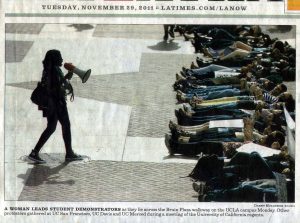
Day of learning at the school house
Frazier is right about one thing. The existing foundation of the school house is rotten. Given all the weight of outside financial interests, teams sporting fortunes, spies in the lab, foreign money in the bursar’s office, bribery, corruption of the scientific method, lawsuits filed from sex play in the dorm, senator dollars for electoral support, university presidents cowering behind their desks from “social justice fighters,” diversity devils patrolling the halls, men on the girls’ team, distorted texts for below grade readers, non-writing assignments, non-thinking trophies for Walden Two progress— just too too much for the floor boards to hold.
And we’re supposed to depend on science to save us!
But still, according to the all-knowing guide Frazier, science is the new order. Arguing against him is a visitor to Walden Two, a foil named Castle, a straw man who argues against Frazier’s “New Order.”
“That’s another familiar name for the ‘improvement’ of people who get in your way… And I’ll bet you have designs on the political machinery too,” Castle continued. “You wouldn’t always be satisfied with voting the Walden Ticket. You’d want to get the offices yourself, and you’d be strong enough to do it.”
“Yes, I must admit you’re right. But what’s wrong with that? As soon as we’re in the majority in any locality, we shall exercise our rights under a democratic form of government and take control.”
“But you have several times suggested that you have little faith in democracy,” Castle said.
“I will do more than suggest, if you like,” said Frazier hotly. “But I am speaking of practical affairs, such as the recovery of taxes in the form of useful services. We have every intention of stepping into democratic politics for purposes of that sort as soon as possible. By reorganizing the local township and county governments we could reduce taxes; recover our own taxes in salaries by putting our own people in office, and at the same time raise the county to our own standards. The school system would naturally fall into our hands, and we might be able to adapt some of the schools to our own use and hence avoid the double taxation of private education. Who could object to that?

FLAG POOPERS, UNITE!
Who indeed?
The funniest part of Walden Two by B.F Skinner is how oddly it reflects on the original woodsy Walden by H.D. Thoreau, a book which sits mightily on the pinnacle of American individualism. Thoreau was such an individual he had only two chairs in the cabin he built: one for himself and only one for society. He’s the guy who wrote that if you find yourself out of step with your neighbor, you are listening to the beat of a different drummer.
In Walden Two— as well as in Seattle, Minneapolis, Lululand, and all points East— I can make out only one single beat drumming in the ears of folks like Brian and Ian, hand in hand, happily giddily furiously righteously marching down ravaged streets to the beat of the bleat of the day.
Who could object to that?
JoCo, 4 July 2020
